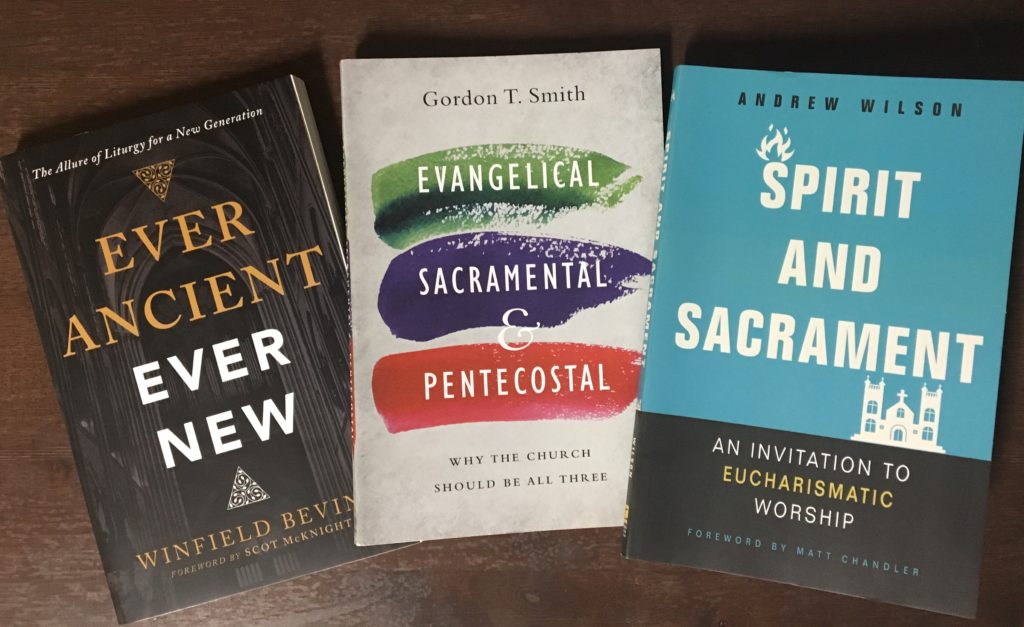In Pentecostal Sacraments (2010, 2015) I suggested that the church’s worship should be an integration of the Spirit, the Word, and Sacraments. For liturgical worshipers, the Spirit is present in the sacraments. For reformed worshipers, the Spirit is present in the Word. Pentecostal worshipers emphasize an unmediated personal encounter with the Holy Spirit. Each worship tradition standing alone has shortcomings. Liturgical worship without the Word and the Spirit may lead to dead formalism. Reformed worship without sacraments and the Spirit may lead to sterile intellectualism. Pentecostal worship without sacraments and the Word may lead to shallow emotionalism. Since the publication of Pentecostal Sacraments, others have called for the integration of Word, Sacrament, and Spirit in Christian worship.

Gordon T. Smith, an ordained minister in the Christian and Missionary Alliance, has written a wonderful reflection that affirms the need for the Word, Sacrament, and Spirit in the Church. He demonstrates that each element has strong historical attestation. Regarding the significance of Pentecost, he affirms immediacy of the Spirit as an experience that matters, but rejects the significance of tongues-speech. (Evangelical, Sacramental, and Pentecostal: Why the Church Should be All Three, InterVarsity, 2017, pp. 121-122.)
Winfield Bevins, a graduate of Pentecostal Theological Seminary and presently on staff at Asbury Seminary, writes about the ‘three streams approach to worship. . . that has come to be known as the Convergence Movement’. The three streams are the charismatic, the evangelical, and the liturgical dimensions of the Christian faith into one flowing river of worship. Bevins believes the three streams movement reveals ‘faith seeking balance in praxis’. (Ever Ancient, Ever New: The Allure of Liturgy for a New Generation, Zondervan, 2019, pp. 142-143, 152.)
Andrew Wilson, teaching pastor at King’s Church in London, has issued a call for Eucharismatic worship, that is, worship that captures the treasures of charismatic practice and sacramental worship. He envisions ‘a service that includes healing testimonies and prayers of confession, psalms, hymns and spiritual songs, baptism in water and baptism in the Spirit, creeds that move the soul and rhythms that move the body. . . young men seeing visions, old men dreaming dreams, sons and daughters prophesying, and all of them coming to the same Table and then going their way rejoicing. . . with dancing in the aisles and angels dancing in the architecture.’ (Spirit and Sacrament: An Invitation to Eucharismatic Worship, Zondervan, 2019, pp. 15-16, 19.)
In Pentecostal Sacraments, I wrote:
The celebration of the sacraments is an ongoing altar call in which the believer encounters God in Christ and through the Holy Spirit. Just as the Spirit animates Pentecostal worship in inspired preaching, anointed singing, joyful shouts of praise, and dancing, the Spirit also animates the sacraments. When believers experience water baptism, Holy Communion, or footwashing, they encounter Christ’s priestly ministry through the Spirit of grace. When the sick call for prayer, holy hands anoint the sick with oil and the Spirit is present. Through the Holy Spirit, worshipers transcend time and space as they share sacramental experiences with Christ and the redeemed community. When believers enter the baptismal water and are baptized into Christ, they share in His personal baptism in the Jordan River. When believers gather at the Lord’s Table to share bread and wine, that is, the body and blood of Jesus, they join with the Lord and all believers of the past who have received bread and wine, and all those in the future who will receive bread and wine. When believers take the towel and basin to wash the feet of another, it is because they have been baptized into Christ and are participants in Christ’s reconciling and sanctifying work. Through Christ the High Priest and the Spirit of grace, sacraments are more than mere reenactments or memorials to God’s redemptive acts; the baptismal water, the towel and basin, the bread and wine, and the anointing oil become mediatory gifts. In Christ and the Spirit, celebration of the sacraments becomes participation in God’s redemptive acts.
I’m currently working on a new edition of Pentecostal Sacraments to be published by CPT Press later this year, or early 2020.
